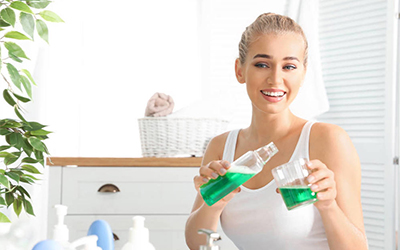Mouthwash is a liquid that is often swished or gargled in the mouth. It is sometimes referred to as “mouth rinse” or “oral rinse.” Certain varieties of mouthwash can help prevent cavities. It can cut germs and reduce plaque buildup.
Rinsing is a common part of many people’s dental hygiene regimens. It can not only refresh your breath, but it can also help you maintain a healthy mouth. If you’re thinking about using mouthwash, make sure you’re doing it properly.
When is the right time to use it?
It is used by some people as a part of their teeth-cleaning practice on a regular basis. You can use mouthwash to get rid of bad breath. When it comes to using mouthwash to freshen breath, there isn’t exactly a set timetable.
Only after brushing and flossing will it help to build your teeth’s enamel and combat gum disease. Before using mouthwash, make sure your teeth have been properly cleaned.
What to do if you’re going to use mouthwash
Typically, mouthwash contains a lot of fluoride and a lot of alcohol. Children, in particular, should avoid inhaling large amounts of either of these chemicals. As a result, the American Dental Association does not suggest mouthwash for kids under the age of six.
Mouthwash should not be swallowed as a habit by adults either. You might like to try utilizing mouthwash to end bacteria and speed up healing. But, if you have open sores or oral lesions in your mouth, you’d better stop using it.
Also, if you have persistent oral lesions, consult a dentist before using an oral rinse in your mouth.
DO’S OF MOUTH RINSING
- Do the thirty to sixty seconds of swishing.
For 30 to 60 seconds, mouthwash should be swished around in the mouth. Make sure you read the label on the bottle you’re using. It’s rare for the mouthwash to be helpful if you swirl it for less than thirty seconds. If you swish for more than a minute, you won’t get any extra advantages.
- Check the list of ingredients.
Mouthwashes are available in a range of different recipes. Each recipe has different constituents. Fluoride is always present in quality mouthwash. Cavities can be avoided by using it to enhance tooth enamel.
Antimicrobials are also included. It can destroy plaque bacteria and odor neutralizers to treat stinky breath. Peroxide will also be included in a teeth-whitening mouthwash. You may ask your dentist what sort of mouthwash is prescribed for your individual needs.
- Pay a visit to your dentist on a regular basis.
Visits to the dentist aren’t the same as dental visits. In the same way, mouthwash isn’t a substitute for brushing and flossing. Cleaning and inspecting your teeth and gums should be done on a regular basis.
A dentist will check for any symptoms of tooth decay or dental problems. A mouthwash, on the other hand, can clean any hard-to-reach areas that your regular oral hygiene regimen may have missed. It’s nice to use mouthwash, but it’s much better to go to the dentist on a regular basis.
DON’Ts OF MOUTH RINSING
- Don’t use a mouthwash that contains alcohol.
Because it dries out the mouth, alcohol is a bad element to use in mouthwashes. If so, there is less saliva available to rinse the germs away. And remember, a dry mouth is more vulnerable to acid assaults from plaque bacteria.
It’s advisable to avoid mouthwashes that include alcohol when choosing one.
- Don’t use mouthwash as a substitute for brushing and flossing.
Rinsing with mouthwash helps. It can’t eradicate plaque bacteria as brushing and flossing can. Mouthwash alone will not be able to remove enough germs from your mouth to prevent cavities and gum disease.
It’s a terrific addition to your oral hygiene regimen, but it shouldn’t be the only thing you’re doing.
The advantages of using mouthwash
There are several advantages to using mouthwash on a daily basis, the most important being fresh breath. Since it is a liquid, it may reach locations where you would not ordinarily brush or floss. Those areas include the roof of your mouth, your tongue, and your inner cheeks.
Because mouthwash kills the germs in these areas, your breath smells better. The question of whether to use mouthwash before or after brushing and flossing doesn’t matter. You can brush and floss with mouthwash either before or after brushing and flossing.
The good news is that its advantages will be the same. Fluoride is also found in a variety of mouthwashes. It aids in the prevention and treatment of cavities. Using mouthwash as part of a dental hygiene routine is essential.
It can help reinforce the benefits of excellent oral hygiene. There are a variety of mouthwashes that each have their own range of advantages. Some have merely the ability to refresh the breath, while others have antibacterial properties.
Can you use too much mouthwash?
Always look at the label of any mouthwash you use before using it. It will certainly include instructions on how to use it correctly. Alcohol is one of the most important elements in mouthwash.
Although alcohol kills bacteria, it can also harm your gums, inside cheeks, and tongue if taken excessively. When swallowing mouthwash, be careful since it includes fluoride, which may be dangerous if taken in large amounts.
Fluoride is beneficial to your teeth’s health, but if you consume too much of it, it can be harmful to your health.
BOTTOM LINE
Mouthwash may be used to clean your teeth, remove plaque, and treat gum disease, among other things. Brushing and flossing your teeth on a regular basis is not a substitute for mouthwash. It must be used appropriately in order for it to be effective.
Remember, mouthwash alone will not heal the underlying reasons of persistent foul breath or suspicion of gum disease. And also, do not forget to consult your dentist if you have any concerns about your dental health.
